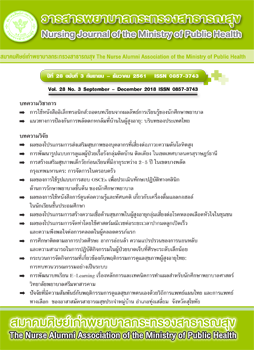The Effects of Health Belief Application Program in Older Adults on Risky Coronary Artery Disease in Community
Main Article Content
Abstract
The lacks of perceived risk in disease severity affected on reducing in perception on health threat. Moreover, perceived benefit and perceived self-efficacy affected to low self-protective behavior. This study was quasi-experimental research designed in the pretest-posttest control group. The purpose of the study was to test the effects of health belief application program among older adults in Community. The samples consisted of 70 older adults who risky coronary artery disease (CAD). 35 subjects in each group were equally assigned by random assignment to an experimental group and a control group, and both of those were no difference in the characteristics. Those of the experimental subjects were received in the program for 6 weeks, but those of the control group were received usual care. Then data were collected and analyzed with descriptive and independent t-test statistics. The finding indicated that after applying for the program, the mean of health belief score in the experimental group was found of being better than the control group with statistical significance (p<.05). It could be concluded that the health belief application program was the useful method for the increased health belief in older adults who risky in coronary artery disease in the community. Thus, researchers have the suggestions for the future research that should be promoted this programs for testing on self-protective behavior in older adults Keywords: coronary artery disease (CAD); health belief; older adults.
Article Details
บทความและรายงานวิจัยในวารสารพยาบาลกระทรวงสาธารณสุข เป็นความคิดเห็นของ ผู้เขียน มิใช่ของคณะผู้จัดทำ และมิใช่ความรับผิดชอบของสมาคมศิษย์เก่าพยาบาลกระทรวงสาธารณสุข ซึ่งสามารถนำไปอ้างอิงได้
References
2.Karnjanapiboonwong A. Coronary Artery Disease (CAD). Annual epidemiological surveillancereport [Internet]. 2015 [cited 2018 March 14]. Available from: http://obe.moph.go.th/
3.Nutchanart S, Nantarat K, Nongnuch S, Chatri S, Upa K, Vichai S. Thrombomodulin Gene -33GA Polymorphism in Thai patients with coronary artery disease. Srinagarind Med J 2015;30(6):543-51.
4.Goldston K, Baillie J. Depression and coronary heart disease: A review of the epidemiological evidence, explanatory mechanisms and management approaches. Clin Psychol Rev 2008;28: 288-306.
5.Scottl H, Todd L. Secondary prevention of coronary artery disease. American Family Physician 2010;81(3):289-96.
6.Rosenstock M, Strecher J, Becker H. Social learning theory and the health belief model. Health Education Quarterly 1988;15(2).
7.Fatma E, Zuhal B. Effect of health belief model and health promotion model on breast cancer early diagnosis behavior: a systematic review. Asian Pacific Journal of Cancer Prevention 2011;12:2555-62.
8.Prasartkaew N, Terathongkum S, Maneesriwongkul W. The effect of a home visit and telephone follow-up program on health beliefs and blood pressure in persons with uncontrolled hypertension. J Public Health 2012;42(3):19-31.
9.Srimahachota S, Wunsuwan R, Siritantikorn A, Boonla C, Chaiwongkarjohn S, Tosukhowong P. Effects of lifestyle modification on oxidized LDL, reactive oxygen species production and endothelial cell viability inpatients with coronary artery disease. Clin Biochem 2010;43:858-62.
10.Chuaytaen T, Ua-KitN. The effect of promoting perceived benefits and perceived barriers program on medication adherence of myocardial infarction patients who underwent percutaneous coronary intervention. Songklanagarind Journal of Nursing 2016;36:56-75.
11.Cohen J. Statistical power analysis for the behavioral sciences. 2nd ed. Hillsdale, NJ: Erlbaum; 1988
12.Chareerat S, Ratsiri T. That Factors predicting preventive behaviors for coronary artery disease among autonomous university staff in Bangkok. Thai Journal of Cardio-Thoracic Nursing 2017;28(2):111-25.
13.Carpenter J. A meta-analysis of the effectiveness of health belief model variables in predicting behavior. Health Communication 2010;25:661-9.
14.Hunthayung D,Waengnork W, Kriengkaisakda W. The effects of an applied health belief model program on self-care behavior of diabetic patients in Meung-Pai sundistrict health promotion hospital zone. Phranakhon Rajabhat Research journal (Science and Technology) 2016;11:36-51.
15.Prasartkaew N, Terathongkum S, Maneesriwongkul W. The effect of a home visit and telephone follow-up program on health beliefs and blood pressure in persons with uncontrolled hypertension. J Public Health 2012;42(3):19-31.
16.Maleewan S, Chamusri S, Wongpiriyayothar A. Effects of home visit program on health beliefs, behaviors and blood Pressure among patients with hypertension in community. Journal of Nursing and Health Care 2016;34(4):63–72.
17.Muenkaewkram S, Duangsong R. Effects of Behavioral Development Program in the Prevention of Complicated Kidney Disease among Type 2 Diabetic Patients: A case study in Banphue hospital Banphue District, Udonthani province. Srinagarind Med J 2013;28(4):461-8.
18.Sarakshetrin A, Chantra R, Kunlaka S. Nursing competency in primary care services in a Changing Era. Nursing Journal of the Ministry of Public Health 2017;27(3):19-28.

